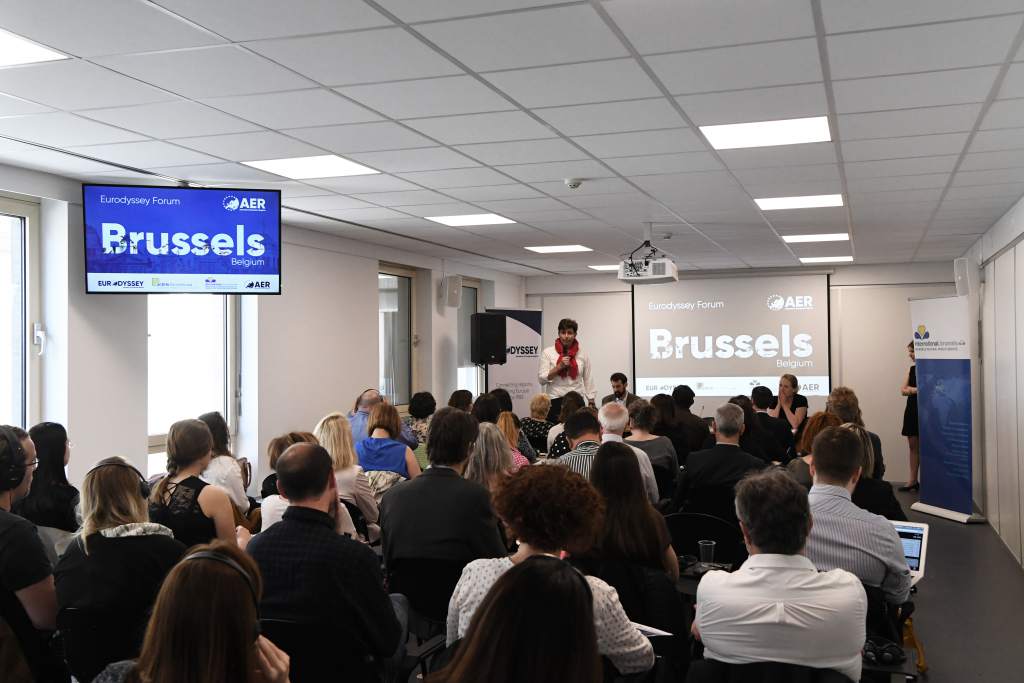 Share this!
Share this!On 18 and 19 April, AER, together with Brussels International (Brussels-Capital Region) and Actiris (Brussels’ regional employment service) organised a couple of events which preceded the more traditional Eurodyssey Forum aimed at raising awareness about the importance of youth mobility and employment for regional development through the medium of the Eurodyssey programme for traineeship exchanges.
These two events along with the Eurodyssey Forum brought together in Brussels around 80 participants from 29 different regions or organisations.
“Discover Eurodyssey” (18 April)
On the afternoon of 18 April, the Eurodyssey regions participated in a mobility fair hosted by Actiris which consisted of information stands where the correspondents of the programme promoted their regions and approached young traineeship-seekers interested in embarking on new professional and cultural experiences abroad. In addition to this, the correspondents also had the opportunity to do some good networking and interact with various stakeholders from different sectors involved in the field of youth mobility.
Grégor Chapelle, Director General of Actiris, welcomed all attendees and dedicated a few words to highlight the advantages of Eurodyssey as a fair mobility scheme that help talented young professionals enter the labour market. This was followed by the testimonials of former Eurodyssey trainees who took the floor to share their experiences of how the programme changed their lives. To wrap up the session, the Eurodyssey correspondents were invited to a cocktail reception where the President of Eurodyssey, Esther Estany, and the hosts, Pierre Gérard (Brussels International) and Arlette Brone (Actiris) wished them a pleasant stay in Brussels and fruitful discussions within the Forum.
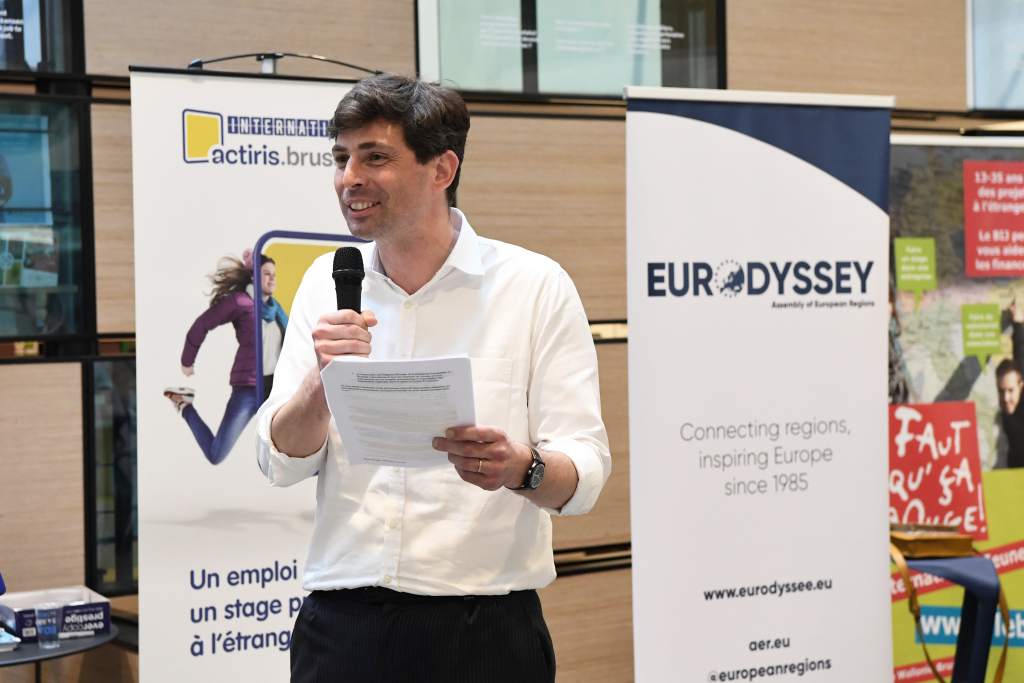
“Regional challenges at stake for youth mobility” (19 April)
On the morning of 19 April, the second Eurodyssey event entitled “Regional challenges at stake for youth mobility” took place at Actiris. This event, based on a round of conferences with multiple speakers, opened with a welcome speech by Grégor Chapelle who stressed the importance of interregional cooperation between the different employment agencies to work jointly for solutions improving the employability of young people. He also encouraged the non-member regions of Eurodyssey present in the room to join the network.
Introductory interventions
This welcome speech was followed by a presentation made by Liesbeth Driesen, Director & Head of Department of Actiris, on traineeship opportunities in Brussels. Through her presentation, Liesbeth gave a broad insight into the traineeship agreements in which the region of Brussels-Capital is part of as well as providing a picture of the state of play of youth professional integration in the region, mentioning that 80% of the trainees in Brussels get a job after completing a traineeship.
Prior to the Presidency’s speech, the promo-video of Eurodyssey produced by Brussels International (Brussels-Capital Region) was officially presented. You can watch the video again just by clicking below!:
Esther Estany, President of Eurodyssey, took the floor to welcome all attendees to the events outlining the conditions and advantages of the programme that add value to Eurodyssey as a fair mobility scheme. She also emphasised the need of reinforcing the principles of Eurodyssey contained in the Procedures and also invited the regions outside the programme to consider applying to become members.
What’s at stake for youth mobility?
The Presidency’s address led directly to the debate panel “Regional challenges at stake for youth mobility” moderated by Vania Freitas, AER Institutional Relations and Advocacy, who introduced the topic and the speakers to the audience. Manel Sánchez, Director of the European Youth Card Association (EYCA), Valentin Dupouey, Secretary General of the Young European Federalists (JEF), and Safi Sabuni, Policy and Training officer at Eurodesk, exchanged views on the challenges but also the opportunities for youth mobility to thrive by bringing down the multiple barriers that hamper cross-border cooperation in this specific area.
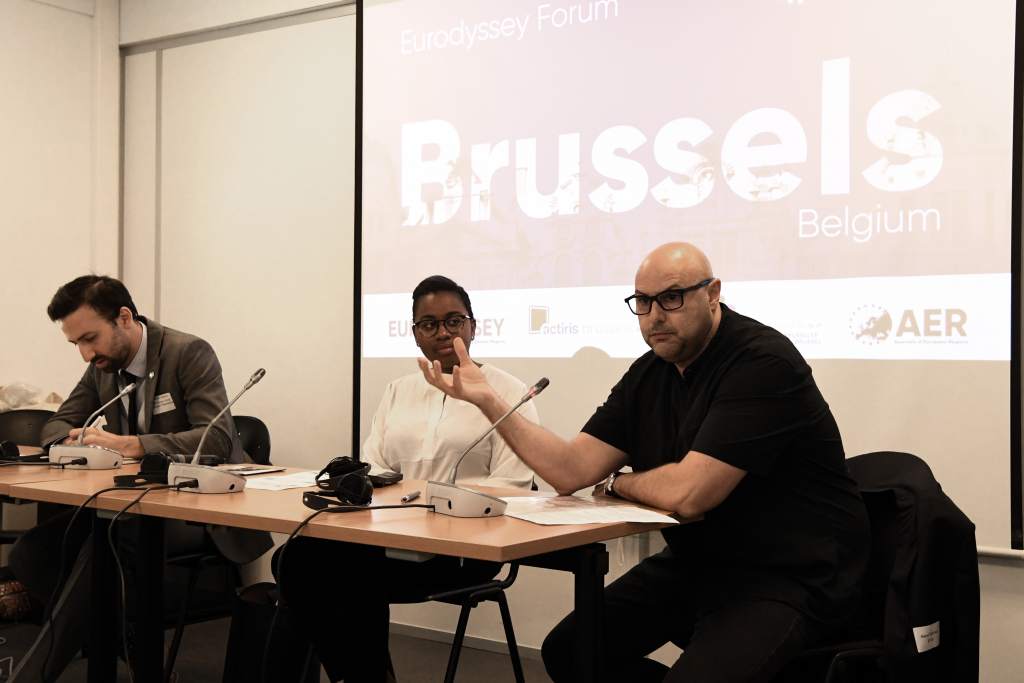
Manel Sánchez (EYCA) described very thoroughly how mobility has expanded exponentially in a period of 30 years from being extremely limited, or inexistent in the past, to the many structures and platforms that work today towards a better implementation of youth mobility policies enabling more and fairer exchanges between territories. In his view, the major challenge is to make mobility more accessible to young people, in particular, for those who are socio-economically in situation of disadvantage.
Valentin Dupouey (JEF) pointed out that many more synergies need to be created between the different actors and organizations that work favouring youth mobility. Local authorities can also contribute to paving the way for youth mobility by working in closer cooperation, building networks and sharing project ideas. Eurodyssey is an example of a successful cooperation scheme between public regional bodies. From his point of view, one of the main barriers hindering mobility is the access to reliable information sources. What is more, the EU investment in youth mobility is still too insufficient to ensure all young people access to a mobility opportunity.
Safi Sabuni (Eurodesk) explained that Eurodesk’s mission has a two-fold objective: to raise awareness about training mobility opportunities and also to encourage young people to become active citizens. She pointed out that there are multiple challenges affecting youth mobility, such as access to information, funding, housing and languages. Sabuni put the emphasis on the information gaps young people encounter when looking into the possibility of embarking on a mobility experience abroad. In light of this, Eurodesk’s core activity is to provide reliable information and knowledge on mobility programmes in a way that young people get easily the message.
Vania Freitas (AER) moved the discussion into a concluding phase by opening the floor to the audience so the participants had the chance to interact directly with the speakers discussing the circumstances accompanying mobility, the funding support to ensure stable mobility structures and the possible future scenarios for mobility in the upcoming years.
Second part of conferences
Following the coffee break, Laurence Hermand, Director of Bureau International de la Jeunesse (BIJ) – Wallonia, made a presentation on the European Project AKI focused on the assessment and recognition of transversal competences, acquired by young adults in international mobility projects, as a means to facilitate their socio-professional integration. The purpose of this project is to identify and make these key competencies –acquired outside school and university curricula– more visible and to increase their relevance in the labour market and society.
Emilio Terrado Vicente, Valencian Community (ES), and Clothilde Dorieux (Actiris, Brussels Capital-Region) made presentations on the theme of funding support for professional mobility in Europe. The former explained how to apply for the European Social Fund (ESF) through the website and its concrete advantages to co-fund mobility programmes, in particular, Eurodyssey. Clothilde also provided a comprehensive insight into the funding programmes for mobility by going through the conditions and specificities of the ESF, the European Solidarity Corps, Your First Eures Job and Reactivate.
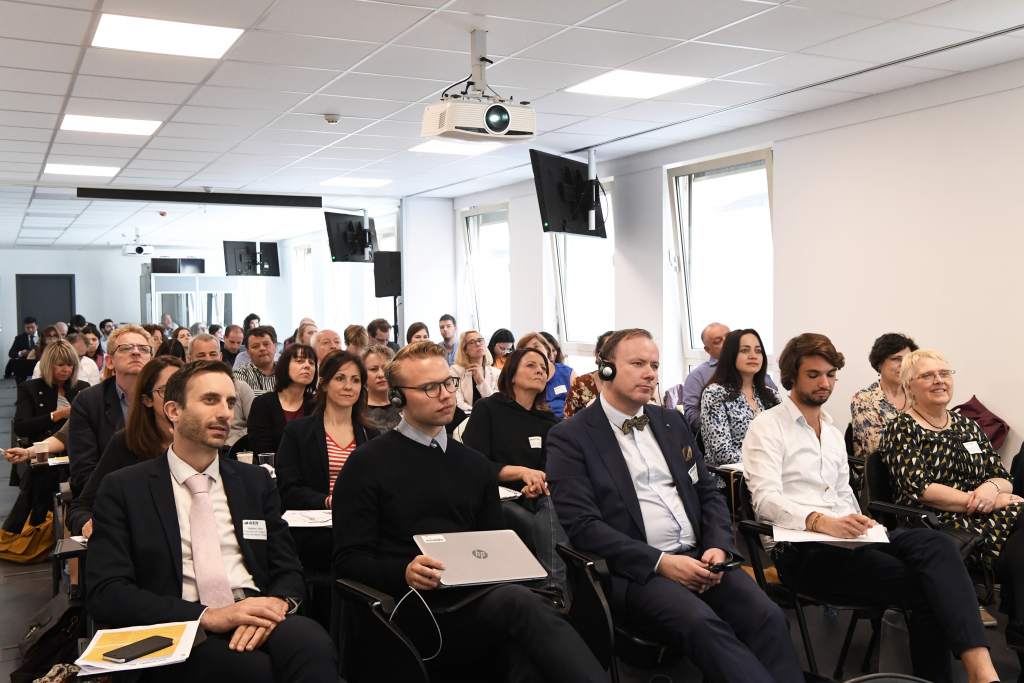
Andrés Muñoz (AER), in charge of the Eurodyssey Secretariat, made a presentation on the steps needed towards becoming a full member of Eurodyssey and also explained the added value of the programme both for the participating regions and the trainees. He started his presentation by mentioning the fact that, thanks to his Eurodyssey traineeship at Brussels International, he later found a job at the AER Secretariat as a result of the successful cooperation between these two organisations. Apart from focusing on the benefits of becoming member of Eurodyssey, Andrés Muñoz also put forward the many opportunities regions can take advantage of by joining the largest independent network of regions –AER–.
This was followed by Laurence Hermand (BIJ – Wallonia) and Arlette Brone‘s (Actiris – Brussels-Capital Region) presentation on the Eurodyssey Pilot Actions, intended to innovate on the mobility exchanges of the programme according to the needs of the regions. These Pilot Actions are based on three proposals. The first one is a “companion project” aimed to allow exchanges between regions in a specific craft-trade domain for young job-seekers in their last year of training. The second one is thematic study visits consisting of a minimum three-day programme on a specific theme taking place in each of the regions involved. And the third proposal is focused on the professional integration of less qualified young people.
Magnus Berntsson, President of AER, in his closing speech thanked all participating regions for their attendance to the Eurodyssey Events & Forum remarking the importance of cross-border cooperation as a win-win-win situation for regions, citizens and companies and how Eurodyssey contributes to realise this objective by increasing training and job opportunities for youth as a result of interregional cooperation.
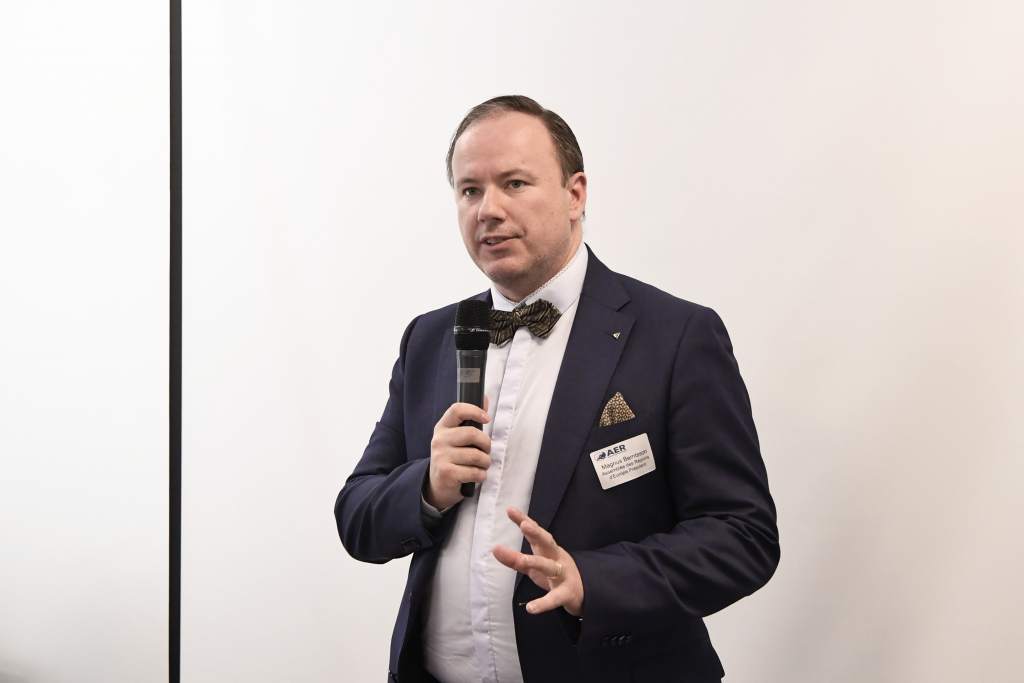
All presentations can be found on the AER event page.
Want to know more about the outcomes of the 2018 Forum? Then click here for further information.
Related Article
It’s all about YOUth!
Photo credits: @Brussels Regional Public Service
